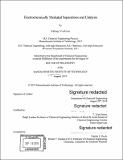Electrochemically mediated separations and catalysis
Author(s)
Voskian, Sahag.
Download1141867212-MIT.pdf (37.53Mb)
Other Contributors
Massachusetts Institute of Technology. Department of Chemical Engineering.
Advisor
T. Alan Hatton.
Terms of use
Metadata
Show full item recordAbstract
Mediated electrocatalysis was also investigated as a means of generating electrolyte-free hydrogen peroxide streams. This was achieved by employing redox mediator phase-transfer (RMPT) to produce and isolate aqueous H₂O from the electrolysis of H₂O and O2 where the quinone mediator was 'trapped' in an organic phase. Conversely, the mediator was trapped in a solid-state electrode, and exposed to alternating reduction and oxidation environments via slug flow. This concept has broad implications because the functionality on the mediator can also be purposefully designed to deliver redox equivalents to reaction/separation environments that would be incompatible with their regeneration. By decoupling the conditions of electrochemistry from the conditions ideal for substrate turnover and separation, the approach established here enables a vast expansion of the utility of electrochemical processes. Other redox-inactive mediators were also studied in this work. This portion investigated the use of task-specific ionic liquids (TSILs) as inert mediators for (i) solventless, non-volatile, amine-Ưbased carbon capture, coupled with electrochemical regeneration via the chelation of cupric ions from a corroding copper electrode, for the release of CO₂; (ii) hydrophobic chelators for liquid-Ưliquid extraction of metal ions from aqueous streams, followed by electroplating or acid regeneration; (iii) hydrophobic separators in Li-Br batteries (iv) antimicrobial activity on epidermal wounds and antifouling activity in thin-film ionogels on catheters. To summarize, this work demonstrates the integration of electrochemical steps into conventional chemical processes via the mediation of redox-active and inert organic molecules, which resulted in significant improvements in performance.
Description
Thesis: Ph. D., Massachusetts Institute of Technology, Department of Chemical Engineering, 2019 Cataloged from PDF version of thesis. Includes bibliographical references.
Date issued
2019Department
Massachusetts Institute of Technology. Department of Chemical EngineeringPublisher
Massachusetts Institute of Technology
Keywords
Chemical Engineering.